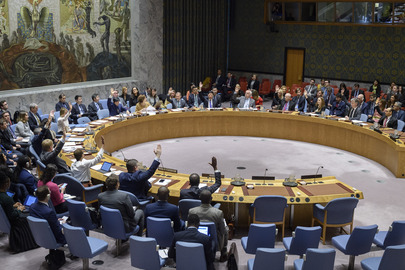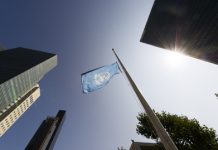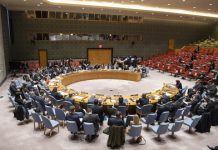Myanmar: unseasonably early rains fuel fears of disease spread
Rains have come early to Myanmar, fuelling fears of disease spread – that’s the latest information from the UN Children’s Fund, UNICEF – just one of the agencies working to help victims affected by the 7.7 magnitude quake that hit 10 days ago.
In an update, UNICEF’s Eliana Drakopoulos said that the situation is increasingly desperate after heavy winds and rain overnight.
“We understand that people want to go into their homes to gather up possessions, but they’re being warned that they should not enter damaged buildings or homes due to this risk of collapse, and the aftershocks are also heightening these risks. People are still mourning, grieving, including our own staff. But we need to look beyond the immediate shock, and UNICEF is now in the process of putting in place systemic support for a longer-term response.”
Millions of people in the worst-affected areas still lack access to life-saving assistance.
More than 25 search-and-rescue teams are working in the country but more international assistance is needed urgently, UNICEF says.
With aid blockade into its second month, misery deepens for Gazans
In Gaza, humanitarians have warned that civilians trapped there face many daily challenges as relief supplies run critically low, caused by the ongoing Israeli aid blockade and bombardment of the enclave.
The development comes as heads of the UN’s aid agencies condemned “acts of war” in Gaza that showed “an utter disregard for human life” – amid Israeli displacement orders that have forced hundreds of thousands to flee with nowhere safe to go.
“We appeal to world leaders to act” and ensure basic principles of international humanitarian law are upheld, the UN aid agency chiefs said, stressing the need to protect civilians, facilitate aid, release hostages and renew the ceasefire.
Today, more than 2.1 million Gazans are being “trapped, bombed and starved again,” they warned.
Any assertions that there is sufficient food inside the Strip to feed everyone is far from the reality on the ground, they insisted.
Over the weekend the UN Children’s Fund (UNICEF) announced the closure of 21 malnutrition treatment centres in Gaza, owing to the resumption of hostilities and the recent evacuation orders issued for areas where the centres were operating.
Ukraine: Mine contamination is the lethal legacy of Russian invasion
An estimated 100 million people in more than 60 countries and territories live under the threat of landmines and explosive ordnance – but war-torn Ukraine is the most heavily contaminated country in the world – the UN Mine Action Service (UNMAS) said on Monday.
According to UNMAS, millions of mines have been planted in Ukraine since the full-scale Russian invasion on 24 February 2022, making it the most dangerous place for unexploded weapons today.
Linked to the rise in conflicts worldwide, the UN agency said that the number of people injured and killed by mines and other explosive ordnance rose by 22 per cent last year.
That amounts to more than 1,000 extra victims compared with 2023, according to the specialized UN agency, established in 1997.
About 85 per cent of the victims of explosive ordnance globally are civilians and more than half are children.
Daniel Johnson, UN News
Music composed and produced by Joachim Harris. All rights reserved.
Source of original article: United Nations (news.un.org). Photo credit: UN. The content of this article does not necessarily reflect the views or opinion of Global Diaspora News (www.globaldiasporanews.com).
To submit your press release: (https://www.globaldiasporanews.com/pr).
To advertise on Global Diaspora News: (www.globaldiasporanews.com/ads).
Sign up to Global Diaspora News newsletter (https://www.globaldiasporanews.com/newsletter/) to start receiving updates and opportunities directly in your email inbox for free.
































